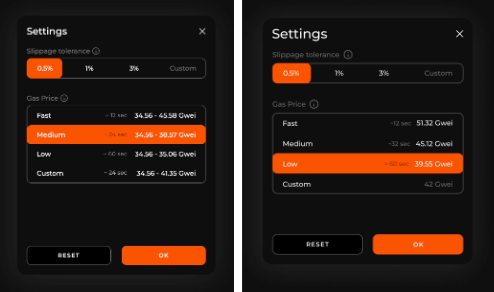YAD Integrates EIP-1559 for Enhanced Gas Cost Calibration & Predictability

Calibrate your gas costs to a Gwei with EIP-1559 added to YAD.Finance. To start using the improved version of our app, just choose one of the chains: Ethereum, Polygon, or Avalanche, go to the settings, and adjust your gas costs like a pro!
Implemented into YetAnotherDeFi, a cutting-edge multichain swap router that revolutionizes liquidity aggregation across dominant blockchains, EIP-1559 is a part of the London Hard Fork of Ethereum that brings a few improvements into your swapping experience. Now the gas price is more predictable, and to a great extent, thanks to the max base fee you can predefine to a gwei. Pay in two ways, while using YAD, either by choosing a calculated range: fast, medium, and low, or by setting up custom values, max base fee and priority fee.
Let’s discuss.
Take a look at YAD’s swap box below and see how the settings differ from each other before and after EIP-1559 is implemented. Basically, what has changed in the UI is that there’s a range now allowing you to push through different kinds of volatility as well as set up your custom settings.
This UI reflects two things: With the legacy code, the range was not flexible, meaning you couldn’t receive your refund back in case your gas price was higher than the market price. With the EIP-1559 feature implemented, you can make the max base fee range flexible and get your refund back.

Here’s a couple of reasons why the Ethereum foundation has suggested the EIP-1559 feature: first, to even the volatility spikes when gas prices were dramatically fluctuating, say up to 97 gwei in May 2023 on the hype of the PEPE meme coin hysteria. The second reason was to make fees more predictable. And also give users more control over how fast they want their transactions processed as well as specify the tip amount they want to pay to the miners.
How does the feature help even the fees? Basically, by burning a so-called base fee, which, if you think about it, is a deflationary mechanism that reduces the overall Ether supply. When a user sends a transaction, they pay a gas fee. The gas fee is used to compensate miners for the computational resources that they use to process the transaction. The gas fee is paid in Ether. But after implementing EIP-1559, the base fee always gets burned, bringing deflationary mechanics to the system. This can help make gas fees more predictable over time, as the supply of ETH gets reduced. What fees are not getting burned, though? Let’s take a look!
Max base fee and Priority fee
Max base fee: Users can specify a max base fee they are willing to pay for their transaction in case of volatility spikes. But they will be charged the base fee determined by the current state of the network only. The rest of the fee will be returned to their wallet.
Priority fee (miner’s tip): The priority fee you set up is 100% up to you, but the higher the price, the faster your transaction will be broadcasted. Compared to the base fee, it will not be burned. Rather, the miner will receive it for their services.
EIP-1559 in YAD
Put simply, the reason why we at YAD have implemented EIP-1559 is that it transforms Ethereum into a more predictable and stable system. With the potential to reduce volatility in gas fees, EIP-1559 reduces miner profiteering, makes gas fees less surprising in times of network congestion, and improves the overall user experience with the network.
Want to try the improved version of our swap box with the EIP-1559 implemented? It’s simple! Just go to Yad.Finance, connect your wallet, choose the tokens to swap, hit the settings button in the top right corner, and choose the custom mode. Calibrate your gas costs down to the gwei and enjoy a more stable Ethereum experience!

